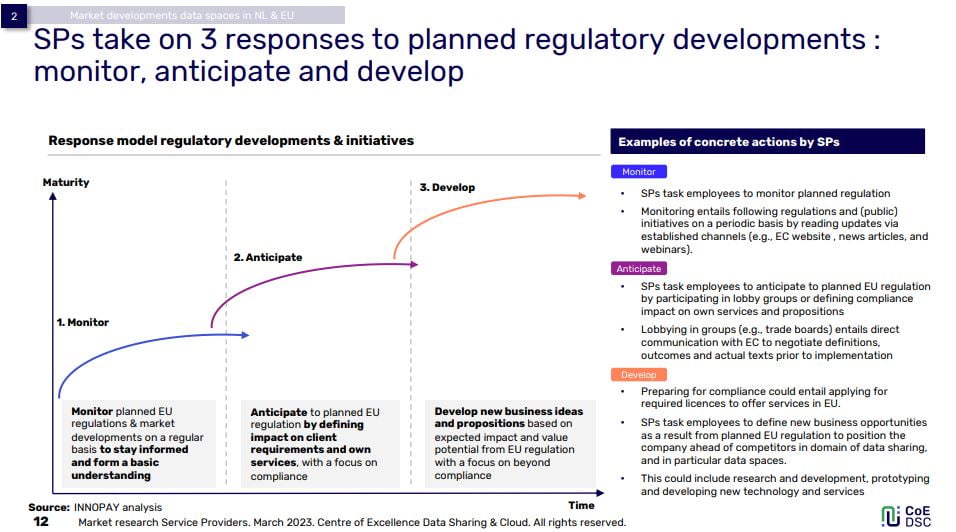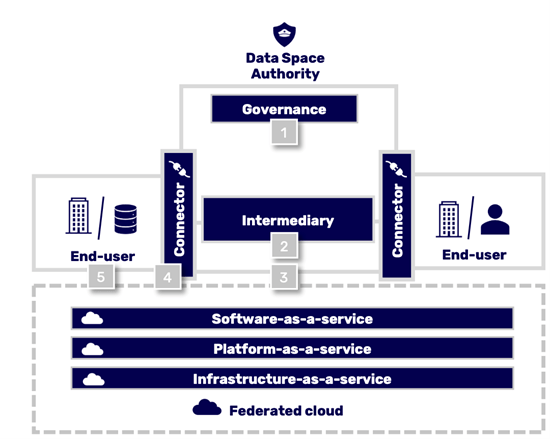The Centre of Excellence for Data Sharing and Cloud (CoE-DSC) aims to unlock economic and societal value by enabling organisations to share data across domains and sectors easily. The CoE-DSC does this, amongst others, by contributing to the advancement of data spaces, both at national and European (EU) level. It is becoming more and more evident that data sharing is an important enabler for realising new economic and societal value. Also, many sectors are investing time, funding and resources in development of data spaces. However, the key success factor for adoption of data spaces is direct involvement of end-users and their service providers for making data available for use in data spaces.
The CoE-DSC conducted market research amongst service providers to learn how they view upcoming EU regulations (e.g. Data Act) and how they position their current offerings for clients.
Download the market research report
Service providers’ response to developments and regulations at the EU level
The European Commission (EC) plans regulatory and supporting initiatives to stimulate innovation in data sharing across sectors and generate new value. Forthcoming EU regulations (e.g., the Data Act and the Data Governance Act) aim to regulate data access, portability, and a level-playing field on data usage. Our research has found that in general, service providers (SPs) take on three phased response types to EU regulatory developments:
- Monitoring planned EU regulations & market developments on a regular basis to stay informed and form a basic understanding of their potential impact
- Anticipating planned EU regulation by defining the impact on client requirements and their own services, with a focus on compliance
- Developing new business ideas based on the impact and potential effects of EU regulation, with a focus beyond compliance
The market research shows that, generally, service providers only monitor forthcoming EU regulations to stay informed and form a basic understanding of what regulations will enter into force. Next to monitoring planned EU regulations, some service providers also anticipate them, with a focus on compliance for their own products and services (e.g., cloud switching under the Data Act), and supporting their clients to become compliant (e.g., mandated IoT data sharing under the Data Act). And lastly, we found that overall, the development of new business ideas and propositions based on the expected impact and value potential of EU regulation by service providers is not a common practice (yet).
Data space building blocks
To discover what is needed to define, realise, and manage data spaces, we enquired with service providers which data space service building blocks they consider to be most important. As a result, at least five types of building blocks have been identified and validated by the interviewed service providers. To put the relative importance of these building blocks into context, two segments have been identified within data spaces. The first segment is the data space authority, which is the governing body on behalf of data space participants and manages and maintains the agreed trust framework and network. The second segment are end-users, which are organisations, both public and private, that participate in a data space through their trusted system environment and by adhering to the agreed trust framework. For data space authorities, the service building blocks are:
- Governance: To support with defining the BLOFT[1] agreements for the design, operationalisation, and governance of data spaces.
- Intermediary: To provide technical and functional components to host and facilitate trusted data sharing among participants.
- Federated cloud: To facilitate connectivity to federated cloud infrastructure to meet specific demands and use cases for cloud use.
For end-users, who share and consume data, the most important building blocks are:
- Connector: To implement connector to facilitate execution of trusted data exchange among participants in line with agreed usage control policies.
- Data & cloud readiness: To ensure that (existing) cloud services are ready and compatible to facilitate data sharing use cases in data spaces.
Proposed next steps
Below are the proposed next steps and advice from SPs for the CoE-DSC to follow up on:
- Bring together end-users and SPs in one setting for develop use cases to create immediate and tangible results (e.g., pilot);
- Evaluate potential value impact of forthcoming regulations per EU Act to enquire opportunities for SPs beyond compliance;
- Re-use service model to stimulate matching supply and demand (e.g. list SPs on CoE-DSC website according to building block model).
Download the market research report
[1] BLOFT is an abbreviation for Business, Legal, Operational, Functional, and Technical. And represent focus areas on which agreements have to be made for design, operationalisation, and governance of data spaces. For example, a topic that has to be considered under Business is Fee structures, for Legal it’s Governance, and for Functional it’s Privacy features






